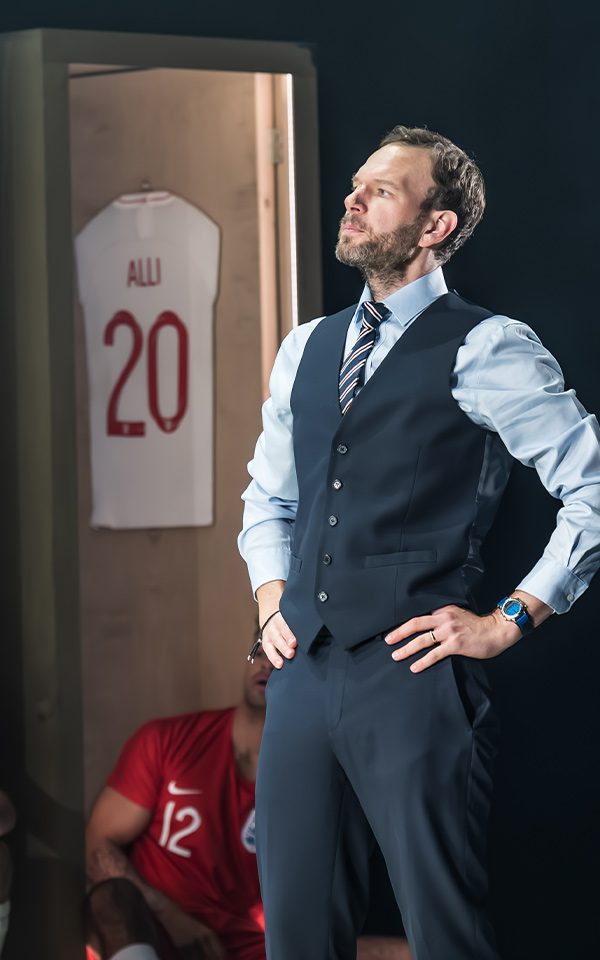There’s a lovely symmetry to the relationship of James Graham and the former England football manager Gareth Southgate. The playwright vividly remembers the night when Southgate as an England player missed a penalty. The moment that England were knocked out of Euro 96.
“I was acting in my first ever play, a production of Of Mice and Men, at my secondary school in Nottingham”, the 42-year-old remembers. “We were all watching the semi-final against Germany at Wembley on the TV as we came off stage. I’d been really into the tournament. It was at home, it was sunny. It was full of drama. And then Gareth missed that penalty. I was in tears going home in the car with my mum. I couldn’t make sense of it.”
That harrowing miss forms the starting point for Graham’s Dear England, his smash-hit play about Southgate’s eight years as manager of the men’s team, which is about to embark on its first national tour.
The play uses Southgate’s revolutionary approach to winning – his belief that in order to conquer their fear of the penalty shootout, the players needed to cultivate a different, warmer and more inclusive version of masculinity – to examine the state of England itself, and of men’s role within an ever-changing society where allegiance to the national football team is a badge of pride.
“I love putting institutions and systems on stage, to help us make sense of our public life”, Graham explains. “The England football teams – the men’s and the women’s – have such an impact. Football as a culture is such a big part of our life. I went to watch Nottingham Forest the other day, and walking over the river to the stadium, it felt like walking to a cathedral in a community, with masses of people swarming towards it.
I wanted to find a story that would make sense of why it matters to us. And I was an England fan as well – it does something to me. I don’t know why I feel so emotional about it, but I do.”

He first thought of writing a play about Southgate after watching the team play at the World Cup in Russia in 2018, when for the first time since 1996, they won a penalty shootout on its way to the semi-finals. “I think like a lot of people, I noticed that it just felt immediately different”, Graham says. “Southgate’s conduct, the new generation of players, the new values and attitudes they carried with them. This wasn’t the traditional football I remembered, which was more aggressive. These guys had a nobility, a compassion and a decency which I thought was really striking. I was curious about how anyone can go into an old institution and begin to change its values and culture so quickly.”
As he read more, talking to football writers to check his conclusions, he realised Southgate was indeed trying something new: he had introduced a psychologist Pippa Grange to work with the players; he was cultivating a new ethos inside the camp. “The neatness and beauty of that arc, that the guy who was the emblem of missing a penalty was the guy who 20 years later came back to solve the problem was just incredible”, Graham says.
The FA asked Graham to wait to meet with Southgate, until the conclusion of the 2022 World Cup in Qatar. By then, however, the National Theatre had decided to commission the play, and Graham went into the rehearsal rooms with the script unfinished. “It was all just research and imagination until the second week of rehearsal, when I went to meet Gareth face to face”, Graham says with a grin. “And that’s when you have to look your company in the eye and say ‘I might discover something that means we have to throw things out’. It was nerve-wracking.”
Meeting Southgate did, in fact, change Graham’s view of him.
The thing that I saw behind his eyes, is that it is a mischaracterisation of him to think he is soft. He is kind, he’s really decent and he has an impossible amount of empathy, but he also wanted to win. I kept talking about how he changed the culture, but he was clear it was all about winning. It wasn’t just to feel good about ourselves.

The theme of what it is to be a man in the modern world, which Southgate has continued to discuss since he left the England job, is very much current. Graham explains: “I believe a writer should try to capture the anxieties of the day and to find stories to make sense of them. The questions of gender and particularly masculinity have been present in our discourse for a while. It’s tough to be a young man at the moment.
Gareth Southgate and this team consciously led an inquiry into the nature of their own masculinity and identity in order to solve a problem. The fact that they asked those questions felt really thrilling. It doesn’t end with despair. It ends with the men learning something about themselves.”
The strength of Dear England – called “the decade’s biggest theatrical triumph” by one paper – is that it captures its issues in the net of pure entertainment, helping theatregoers understand the power of sport and sports lovers appreciate the appeal of theatre. “I’ve loved hearing people saying that they suddenly understand why people care so much about sport. And seeing traditional sports goers sitting and enjoying a play. The audience is often on its feet at the end, dancing along to ‘Sweet Caroline’. We didn’t imagine that would happen. It taps into some visceral connectivity, which feels great.”
Dear England, the uplifting, thought-provoking and inspiring play about Gareth Southgate’s England men’s football team, is visiting Mayflower Theatre, Southampton on tour.
I’ve got so many happy memories on the South Coast but have sadly never had a play of mine staged in Southampton, so I’m beyond delighted that it’s this production that will achieve that milestone.


Dear England
13 – 17 January 2026 | Mayflower Theatre
Football and non-football fans alike will be brought to their feet in this joyous, five-star ‘new stage epic’ (Telegraph).
★★★★★ ‘A theatrical spectacle as uplifting as any England victory’ The Telegraph


